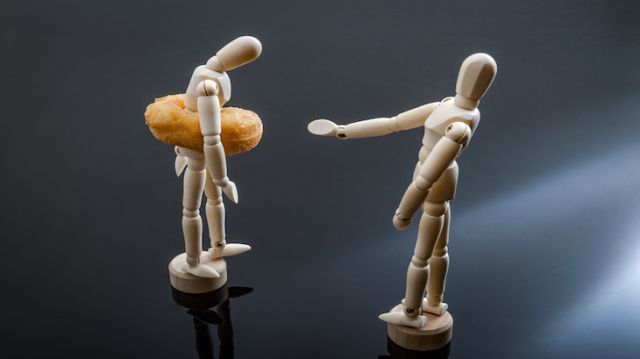We are all created equal, right? Unless of course you are overweight. In this age of extreme political correctness, fat shaming has become the last form of accepted prejudice. Since obesity affects all people, no matter what race, religion or sexual orientation, somehow that makes it okay. I won’t insult your race — that would make me a bigot — but I can call you a fat slob.
Fat shaming is as sickening as any other prejudice
Even though more than two-thirds of American adults are overweight or obese, many people seem to be bothered by this condition. So much so that 61 percent have no problem with making negative remarks about a person’s weight according to a poll. That’s because overweight people are presumed to be lazy, undisciplined and stupid.
Recently, a server at All Stars Bar & Grill in Warwick, Rhode Island, was fired after he referred to a customer as “fatty” on his receipt. Dillon Arnold told NBC 10 News that he was on the patio at 1 a.m. when the server brought him his bill. The restaurant routinely adds the customer’s name on the bill, but instead, the server typed the word “fatty.”
Arnold told NBC10 that he was signing the slip when he noticed what was written on the receipt.
“I didn’t really pay attention to it yet, and then I just happened to read it and I saw it in the corner and I was like, ‘Wow,’ and my heart just dropped,” Arnold said.
Ironically, the server in question was owner Tony Ambrosio’s son. But that didn’t stop Ambrosio from firing his son and banning him from the restaurant for life. In his heartfelt apology Ambrosio said, “I want to apologize to you, Dillon from the bottom of my heart I apologize. That’s not the type of person that I am, my employees are, or my child.”
Ambrosio’s fat-shaming son, who has no doubt learned a hard lesson from this experience, also reached out to make amends, according to the Daily News.
“What I did was immature and I acted without thinking about the consequences,” he said on social media. “I acted in a way that was rude, childish, and totally inappropriate. Due to my actions, I was terminated, rightly so.”
Meanwhile, Ambrosio had to involve the police because of threats he was receiving. While Dillon Arnold doesn’t blame the father, nor wish anything bad against him, he told WPRI, “It kind of ruined my self-esteem a little.”
Harmful psychological effects of fat shaming
Fat shaming hurts a person to the core. It affects their self-esteem, well-being, and can make them depressed. But there’s no law against calling someone fatty. And that sends the message that fat shaming is a socially acceptable pastime.
A study published in the Journal of Obesity found that making someone feel bad about themselves because of their weight makes up 40 percent of the harmful psychological effects associated with obesity. Fat shaming is real and it is a problem. Our society is more accepting of alcoholics and drug addicts than it is of obese individuals. Even though almost 78 million adults and 13 million children in the United States are obese according to The American Heart Association.
What type of person fat-shames?
Some people believe an obese person deserves to be fat-shamed because it’s their own fault. They let themselves get that way because they eat too much — no exceptions, one diagnosis fits all. A general misconception that society still clings to is that obesity can easily be reversed — by simply putting down the fork.
But if you think it’s only mean-spirited people who fat-shame, think again. Carol C. Ross, MD, for Psychology Today, believes that fat shaming is hurled at the obese from every direction:
- Apparently, over 50 percent of doctors think their overweight patients are ugly, awkward and noncompliant with treatment.
- Almost one-quarter of nurses admit they feel repulsed by obese patients.
- Almost 30 percent of teachers said that being obese was the worst thing that can happen to a person.
- Over 70 percent of obese people report being mocked about their weight by a family member.
- Even children as young as four are hesitant to make friends with an overweight child.
There are two types of people who fat-shame: So-called “well-intentioned” family members, friends and colleagues, or hateful and negative people. Either way, the effects are the same. The former believe that making overweight people feel ashamed of their weight or eating habits actually helps motivate them to lose weight. But guess what? Fat shaming doesn’t motivate people to lose weight, it just makes them feel bad about themselves and actually pushes them to eat more and gain more weight. And if that’s the real intention behind shaming, then it works.
—Katherine Marko

